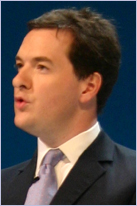Original URL: https://www.theregister.com/2007/03/09/uk_conservatives_applaud_open_source/
Britain's Tories love open source (true)
All aboard the Osbornesource bandwagon!
Posted in Channel, 9th March 2007 05:21 GMT
George Osborne, Britain's shadow chancellor of the exchequer, has stuck the Conservative Party's banner firmly on the internet bandwagon.
Speaking at the Royal Society of Arts yesterday, he applauded the "democratisation of information" brought about by the internet.
And he championed the Open Source movement by stating how the British government should save money by ditching its conventional software licenses.

Osborne suggested that the principles of transparency used in open source software development could also be applied to political discourse and the workings of the establishment.
"We need to harness the internet to help us become more accountable, more transparent and more accessible - and so bridge the growing gap between government and governed," he said.
However, one Open Source guru who is advising Osborne told The Register that he couldn't speak to us on the record for fear of losing his new-found links to power. It was too great an opportunity for the Open Source movement to pass up, he said.
Bottoms up
According to Osborne, the internet phenomenon was "rapidly eroding traditional power and informational balances".
It is an alluring idea, and one that enamours British politicos, boxed in as they are by spin and secrecy.
Osborne described the internet ideal as well as any suited-and-booted revolutionary - with a touch of condescension: "The Internet is like a child pushing at boundaries of authority and challenging the established way of doing things."
"The challenge is for the pushed to resist the urge to push back - to regulate and legislate; to try to tame and control," he said, in contrast to the Labour government's instinct to regulate the internet, and suggestion that the freedom child, since having been proven so effective on the web, should be shown upstairs: "Top down politics is no longer sustainable in a bottom-up age."
The internet phenomenon has inspired in Osborne three policy ideas, he say. The first is the democratisation of information, in the name of which his Government Spending Transparency Bill was being pushed through the legislature. This would involve the details of government spending to be published online for all to see. But his office said just what information was published would be limited with the commercial in confidence arrangements it struck with its suppliers.
His second policy idea is for the government to use "social networks [as] an opportunity to connect with and listen to new audiences."
Osborne didn't say how this might be done, but he reeled off a lot of examples like MySpace and the mobilisation of protesters over the internet. Like other politicians who have tried to claim some of the internet's magic for their own, he appeared not to understand that like any communication medium that has come before it, the internet has improved the quality of debate and participation only for social networks themselves.
Social groups still operate as pockets of specialism, activism or interest, whether it be bloggers on the campaign trail or mums telling one another how best to change a nappy. There's only so much anyone can read, there are only so many brands anyone can trust and there is only so much room in the ever shrinking corridor that leads up the establishment hierarchy to lofty eyries* of power.
The third policy idea was sort of like the first, only he it seemed more certain. That is, using the example of what Osborne called open source collaboration in science, industry and the public sector, he pointed to how the government might "get on board" by drawing more, better information from the communities they serve, and so improve their services.
True Blues don Red Hats
Osborne also declared how the government could save five per cent of its budget, or £600m, by using more Open Source software. Only he applauded Microsoft's "engagement" with the Open Source community.
"This is not about being anti-Microsoft," he said, "Microsoft is an important and valued employer in the UK."
Microsoft has caused some consternation in the Open Source community recently for the nature of its deal with the The British Educational Communications and Technology Agency (Becta), the procurement sheriff for schools. As Osborne recognised, the system should be reformed, as small firms and Open Source suppliers are being cut out of public sector procurements so conssistently the whole system . Schools, for example, could save 50 per cent of their IT costs if they used Open Source, he said.
Nice idea, but as Microsoft has held Becta to a secrecy clause, the competition is barred somewhat from making its way in.
The world doesn't appear to be changing quite so radically as we would like to believe the politicians are telling us - but it would be a darn sight duller if the rhetoricians spoke like civil servants, and that's why the democratisation of information will only go so far.®